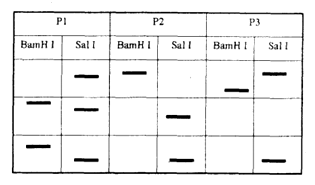 Multiple Choice Questions
Multiple Choice QuestionsThe graph below shows frequency distribution of different sizes of cell during different stages of cell culture.

From this pattern of growth we can draw conclusion that
Most of the cell divides at same time
Rate of cell division is constant
Cell does not divide
All the cell divides at same time
Which statement is true aout progenitor cells ?
They are same as stem cells
They are totipotent cells
They can divide but do not remain differentiated as stem cells
They cannot divide
Ants and bees social structure include queen, sterile female workers and soldier drones. This is best example of
Eusociality
Sub-social
Group selection
Altruism
Yeast artificial chromosome (YAC) vectors contain selectable markers. Loss of which marker at the cloning side distinguishes the re‐ligated YACs from the original vector marker?
TRP-1
SUP4
URA3
CEN
Two E.coli cultures A and B are taken. Culture A was earlier grown in the presence of optimum concentration of gratuitous inducer IPTG. Both the cultures are now used to inoculate fresh medium containing sub‐optimal concentration of gratuitous inducer. It was observed that culture B was unable to utilize lactose, whereas culture A did so efficiently. The reason behind this is
Pretreatment with IPTG has resulted in a mutation as a result of which lac operon is constitutively expressed
IPTG has made the cell membrane more porous to small molecules and so lactose is taken up more efficiently by A as compared to B
In culture A, lactose permease was induced to a high level, during pretreatment with IPTG, which allowed the preferential uptake of lactose
In culture A, IPTG activated a receptor which bound lactose more efficiently, thereby triggering a signal
Insertion lambda vectors are used to create cDNA librabries, in some insertion vectors, the site of insertion is within the cI gene. The recombinants which are cI‐ can then be screened by plating on E‐coli hfI. The gene hfI encodes a protease that control lytic‐lysogeny decision through which mechanism?
HfI protease degrade cI, thereby promoting lytic pathway
HfI protease degrade cIII and so cI cannot interact with cII lysogenic pathway is thus preferred
HfI protease degrades cII and therefore cI synthesis cannot be established, thus lytic pathway is preferred
HfI rotease degrade INT, the protein involved in phage integration and the lytic pathway is initiated
To keep them in a totipotent state, embryonic stem cells need to be maintained in a medium supplemented with
Growth hormone
Leukemia inhibiting factor
Nestin
Insulin
In order to prevent tetanus in neonates, one of the following treatments can be adopted.
A. Treatment of the infant with anti-toxin and the toxoid,
B. Immunize of the mother with the toxoid.
In case of A, the treatment can be given
a. immediately after birth
b. after the onset of the condition.
In case of B, the immunization has to be done
c. before pregnancy
d. late in the pregnancy.
The correct combination is
A/ a
A/ b
B/ c
B/ d
Genomic DNA of transgenic plants (P1, P2 and P3 obtained by transforming with binary vector A whose map is depicted below, was digested with BamH I and Sal I and hybridized with a labeled fragment X

The pattern obtained in Southern hybridization is shown below:

Based on the above, which of the following interpretations is correct:
All the plants (P1, P2 and P3) contain two copies of the transgene.
P1, P3 contain one and P2 contains two copies of the transgene.
P1 contains two, whereasP2 and P3 contain one copy of transgene each.
P1 and P2 contains two and P3 contains one copy of the transgene.
The following are statements about molecular markers in the context of plant breeding.
A. Molecular markers can be used for elimination of undesirable traits.
B. Molecular markers cannot be used for estimation of the genetic contribution of each individual parent in a segregating population.
C.molecular markers are used for mapping of QTLs, which is also possible by conventional techniques.
D. Molecular markers can be used for selection of individuals from a population that are homozygous for the recurrent genotype at loci flanking the target locus.
Which of the above statements are TRUE?
A and B
A and C
A and D
B and C
C.
A and D
Among the given statements, statement A and D are true.
